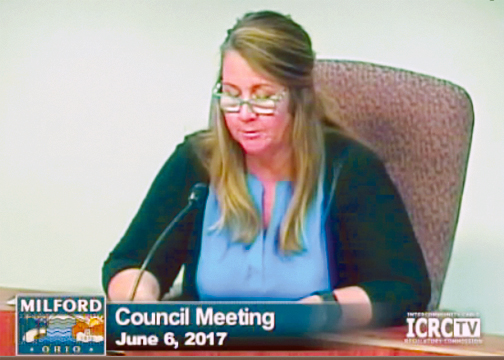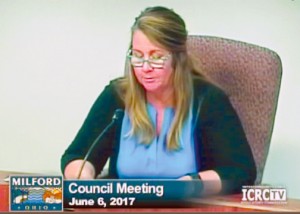

By Brett Milam
Editor
The city of Milford will not be the “guinea pig” for medical marijuana cultivators and dispensaries in the county, according to the June 6 city council meeting.
Vice-Mayor Amy Brewer said several groups have contacted the city regarding the cultivation and dispensing of medical marijuana.
Brewer cite House Bill 523, which was passed by the Ohio Legislature on May 25, 2016 adn signed into law by Governor John Kasich a month later. The law went into effect on Sept. 9, making Ohio the 25th state to legalize marijuana for medicinal use.
Under the new law, patients with qualifying medical conditions will receive legal protections, and the state will begin the process of establishing a regulatory system for medical marijuana production and distribution, according to a press release from Ohioans for Medical Marijuana, the group behind a proposed ballot initiative that inspired legislators to adopt House Bill 523.
“What took place last Thursday was largely symbolic,” said Aaron Marshall, spokesperson for the group. “We’re still 18 months to two years away from having a fully functional medical marijuana system here in Ohio.”
Local councils within the county responded quickly to the new law: The Miami Township Board of Trustees voted to initiate a zoning text amendment stating, “Marijuana cultivators, processors and retail dispensaries are prohibited within all Districts,”; the village of Bethel council voted to adopt a six-month moratorium on the issuance of any zoning permit related to medical marijuana in the village; and both the village of Moscow and Batavia Township followed in those governments’ footsteps.
As of June 6, this year, Milford had not yet joined the fray with respect to any ordinance in response to the new legislation, Brewer said.
“The [Public Services] Committee agreed to make a motion to draft an ordinance to prohibit retail dispensaries, cultivators and processors within the city limits and declaring it to be an emergency,” Brewer said. “No medical marijuana related business or home occupation may be established, operated or maintained within the city; nor shall any provision of a zoning code be constructed to permit the use of any property for that purpose. This prohibition shall apply to all zoning districts within the city.”
After Brewer read her state, Councilman Ed Brady had a question.
“So I missed the meeting; it doesn’t explain the thinking. Why would we, if it’s approved by the state of Ohio to do it, why would we not do it?” Brady asked.
Brewer responded that when it was brought up to her and her fellow Councilman Fred Albrecht, they looked at each other and said, “Well, let’s debate this.”
“Because our knee-jerk reaction was to say no because we were scared of it,” Brewer said. “But then we wanted to make sure that we had hatched out all aspects of the business aspect of it and what, if there was any benefit to it.”
Brewer said there are some benefits to some who need it.
“But I think for Fred and I, the most compelling argument came from our assistant police chief when he talked to us about what was currently going on in Denver,” Brewer said. “According to our assistant chief, this would be a cash business, so they have increased crime rates out there and it’s not controlled and it wasn’t good and things weren’t thriving well in Colorado. And he felt like it would bring in more people searching for the drug and crime going up with it being a cash business.”
Councilman Fred Albrecht jumped in to add that the assistant chief, Sean Mahan, who was appointed earlier this year, also said the “THC in this marijuana was much, much higher than what you find in the streets and can cause overdose.”
The Drug Enforcement Administration’s fact sheet on marijuana reports that there has been no reported death from overdose of marijuana. However, Dr. Jerome Avorn, a professor of medicine at Harvard Medical School told Politifact that the main risk from marijuana is from “risky or stupid things people do after using it, such as driving, rather than from any toxic effects of the substance itself, which is remarkably safe.”
“And the other thing is, we couldn’t really see an economic benefit to the city because it’s like 3,000-9,000 square feet and you’ll have maybe two or three people,” Albrecht said. “The other thing is, we looked at the other cities around us and they all are jumping on the bandwagon and saying no right now and there’s nothing that says you can’t say yes later, but right now, we didn’t really want to be the guinea pig.”
Brewer added that they want to see what somebody else does and then council can rescind, revise this ordinance until they know more. She said it was “prudent to say no right now.”
“Another interesting thing that’s going on right now in Colorado when they legalized — three things are going on,” Mayor Laurie Howland said. “One, no banks will take the money because it’s still federally illegal. Two, kids are coming to school high and it’s automatic expulsion. And one of their biggest problems is tourists who come out to get the weed. Tourists will eat six or seven brownies and end up in the emergency room.”
Howland said there are a lot of kinks in the system and with education that need to be worked out.
Michael Minniear, law director for the city, said he agrees that it’s not a good idea to be the first.
“I think council needs time to investigate this matter,” he said. “And having been in law business the majority of my adult life, there’s such a thing as unintended consequences when you pass a new law that you really don’t perceive unless there’s some kind of background or history that’s gone before you. This is an ordinance. It can be changed next week. It can be changed next council. It’s not like it’s going to be written in concrete.”
But Minniear said he thinks it’s a good idea to give council some breathing room.
“This ordinance is being passed as an emergency measure for the immediate preservation of the public peace, health, welfare and safety of the city of Milford,” Minniear said, as he read the wording of the new ordinance.
Albrecht, Brady, Brewer, Councilman Ted Haskins, Howland and Councilwoman Sandy Russel all voted yes on the ordinance.
